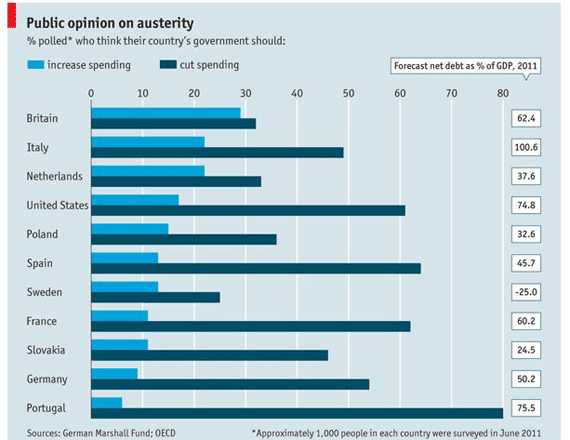Friday File: The Palestinian UN Statehood Gambit
More on:

Above the Fold. The Palestinian Authority says it will proceed with its bid next week for full UN membership. The effort will fail because the Security Council must approve new members, and the United States will veto the membership resolution. The most the Palestinian Authority can get is a General Assembly vote making it a “non-member state.” Palestinian leaders understand this is how events will play out. They hope that recognition by the General Assembly will strengthen their negotiating leverage with Israel. As Robert Danin argues in a piece that you really should read, state status would give Palestinians a few diplomatic benefits, “but the net outcome would likely set back, rather than advance, their national aspirations.” Here’s one problem: the statehood bid would deliver an intentional political black eye to the Obama administration both abroad and (more importantly) at home. The president’s critics will add it to their bill of indictments against him, further limiting his dwindling options on the issue. (Rick Perry writes in today’s Jerusalem Post that “unfortunate errors by the Obama administration have encouraged the Palestinians to take steps backward from peace”; expect his fellow Republican presidential candidates to follow suit if they haven’t already.) Even if the White House is inclined to be forgiving, Capitol Hill won’t be. Congressional sentiment is bipartisan: seek statehood and U.S. aid to the Palestinians stops. This is no small thing. The United States provides the Palestinian Authority with more than half a billion dollars a year. An aid halt could scuttle the one bright spot in an otherwise gloomy picture over the past few years: the authority’s successful efforts to build its capacity to deliver services in the West Bank and provide better security for both Palestinians and Israelis. Here’s a rule of life: don’t antagonize a benefactor unless you have another lined up. The Palestinians don’t, which is one reason to hope that they won’t persist in provoking what looks to be a certain diplomatic train wreck.
CFR Event of the Week. CFR hosted a symposium on Monday to assess the legacy of 9/11. The conversations ranged from counterterrorism strategy to an assessment of whether the United States remains vulnerable to attack. Among our guests was Philip Zelikow, who may be uniquely qualified to discuss the long-term policy implications of the attacks. Not only is he a distinguished scholar and policy practitioner, he served as Executive Director of the 9/11 Commission and is the reason why its final report is so readable. Philip sat down to discuss the decade since 9/11 with Richard Haass. You can read the transcript of their conversation, download the audio or watch the video below:
Read of the Week. If you want to understand why Egyptians revolted earlier this year and where Egypt might be headed in the future, you must read Steven Cook’s new book, The Struggle for Egypt: From Nasser to Tahrir Square. It is a sweeping history of a country that has been struggling for more than half a century to define what it is, a struggle that has profound consequences not just for Egyptians but for the region and American foreign policy as well.
Blog Post of the Week. Stewart Patrick is feeling bullish about U.S.—India relations, so much so that he calls them “strategic partners with a limitless future.” “Limitless” is a pretty strong word. But I take Stewart’s general point—India and the United States have some significant common interests. What they don’t have is a long history of working well together. One of the tests of U.S. foreign policy in the coming years is to change that fact. By the way, what prompted Stewart’s post was the release of the joint CFR-Aspen Institute India report, The United States and India: A Shared Strategic Future. The report was drafted by a high-level study group co-chaired by Robert Blackwill, former U.S. ambassador to India, and Naresh Chandra, chairman of India’s national security advisory board. The report is well worth reading.
Poll Question of the Week. Gallup has a standard polling question that it asks monthly: “What do you think is the most important issue facing this country today?” Gallup released the results of its September poll this week. Guess what, foreign policy was essentially a no-show. The only foreign policy issue to crack the top ten was “wars/fear of war.” Three percent of respondents mentioned it. The runaway winner in the most important issue derby is “unemployment/jobs” (39 percent), with “economy in general” in second (28 percent). These numbers are all you need to know to understand why foreign policy is barely mentioned in the presidential debates even as the number of foreign policy problems facing the United States grows.
Chart of the Week. Americans want the federal government to rein in spending. Guess what? Many Europeans feel the same way about their own governments. The Portuguese, Spanish, and French publics are even more eager to slash government spending than Americans are, and the Germans, Slovaks, and Italians aren’t far behind. The one problem with this zeal to cut, at least if standard economic wisdom is to be believed, is that in the short-run further government budget cuts are going to depress already sluggish economies.
Chart Source: Economist.
Too Good Not to Note. Steven Cook explains what Turkish Prime Minister Recep Tayyip Erdogan was up to with his recent tour of Egypt, Tunisia, and Libya. Micah Zenko thinks it is a bad idea to extend the U.S. military presence in Iraq beyond December 31. Jack Goldsmith argues that Dick Cheney, unlike George W. Bush and Donald Rumsfeld, never recognized that his passion for unilateral American action was self-defeating. Barry Eichengreen thinks that Europe is on the verge of political breakdown. Dani Rodrik worries that both Europe and the United States suffer from a lack of fiscal imagination that is making their economic woes all the worse. Matt Bunn looks at how to improve nuclear safety and security in the wake of Fukushima. Steve Clemons argues that Senator Kyl should take back his threat to step down from the congressional super committee if defense spending is cut.
Perils of Prediction. “Colin Powell will replace Robert Gates as secretary of defense.” Tom Korologos, December 30, 2010. Leon Panetta succeeded Robert Gates in July, becoming the 23rd secretary of defense.
Quote to Ponder. “The best way to win an argument is to begin by being right.” Jill Ruckelshaus, Saturday Evening Post, March 3, 1973.
A Reason to Smile. Winning rivalry games.
More on:
 Online Store
Online Store
